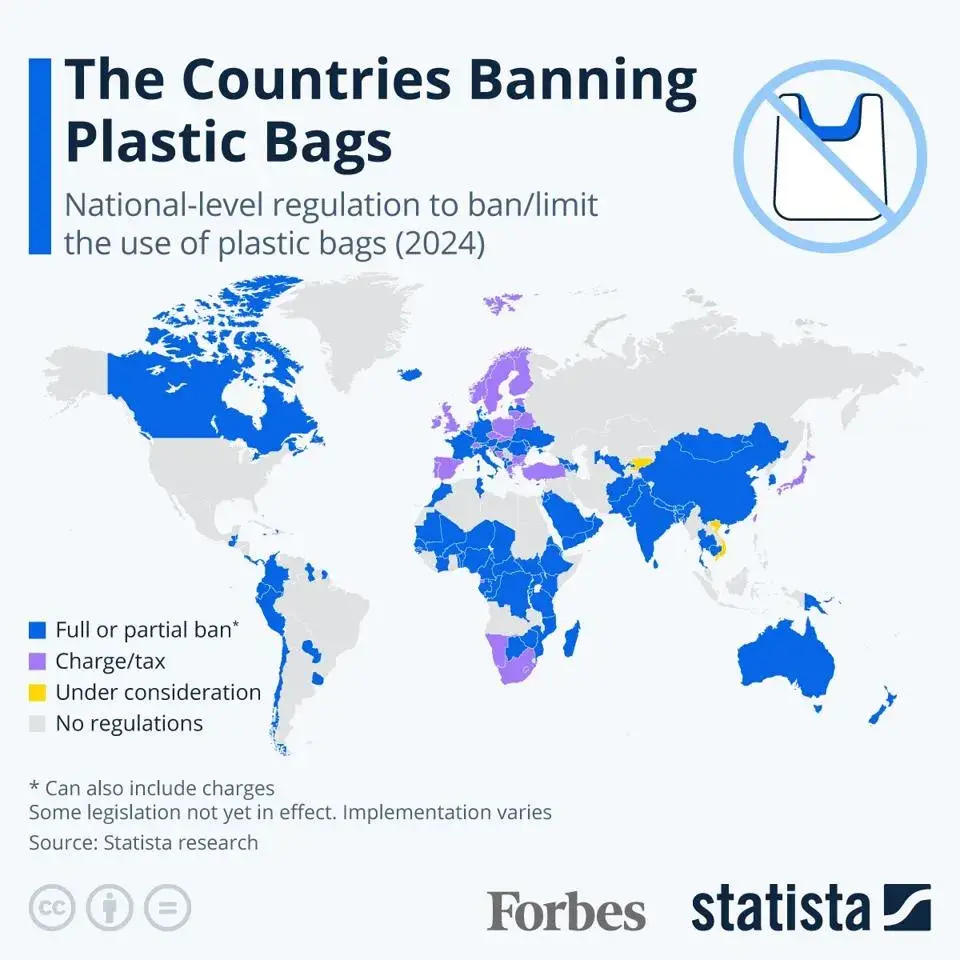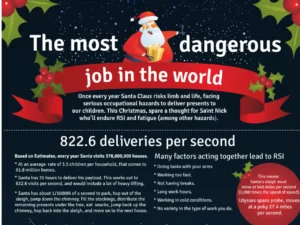Plastic pollution has become a critical environmental issue, with plastic bags being one of the major contributors to land and ocean pollution. In response, many countries have implemented regulations to ban or limit the use of plastic bags. A recent infographic by Statista, in collaboration with Forbes, provides a detailed overview of national-level regulations around the world as of 2024. This article explores these regulations, highlighting the countries banning plastic bags that have taken significant steps towards reducing usage and the various strategies they have employed.

Global Overview
The infographic categorizes countries into four groups based on their approach to plastic bag regulation:
Full or Partial Ban (indicated in dark blue)
Charge/Tax (indicated in light blue)
Under Consideration (indicated in purple)
No Regulations (indicated in gray)
Countries with Full or Partial Bans
Countries with full or partial bans on plastic bags are leading the charge in the fight against plastic pollution. These bans often include prohibitions on the manufacture, import, sale, and use of plastic bags, with some exceptions for specific uses. The implementation of these bans varies, with some countries enforcing them strictly while others allow limited use under certain conditions.
Notable Examples:
Australia: Known for its strict environmental policies, Australia has implemented bans in most of its states and territories, significantly reducing plastic bag usage.
European Nations: Many European countries, including France, Italy, and Germany, have enacted comprehensive bans, showcasing a strong commitment to environmental sustainability.
Kenya: One of the strictest bans globally, Kenya’s legislation includes severe penalties for manufacturing and using plastic bags, significantly curbing their prevalence.
Countries with Charges or Taxes
Some countries have opted for economic disincentives to reduce plastic bag usage, implementing charges or taxes on their use. This approach aims to encourage consumers to switch to reusable alternatives by making single-use plastic bags less economically attractive.
Notable Examples:
United Kingdom: A levy on plastic bags has been highly effective, reducing their use by over 80% since its implementation.
Ireland: One of the first countries to introduce a plastic bag tax, Ireland has seen a dramatic decrease in plastic bag consumption, setting an example for others to follow.
Countries with Regulations Under Consideration
Several countries are currently in the process of considering regulations to curb plastic bag usage. These nations are exploring various legislative options and conducting impact assessments to determine the most effective strategies for their contexts.
Notable Examples:
Canada: With growing public support for environmental initiatives, Canada is moving towards national legislation to ban or limit plastic bags, with several provinces already implementing local measures.
India: Although some states have already introduced bans, a national-level regulation is under consideration to standardize efforts across the country.
Countries with No Regulations
Despite the global trend towards reducing plastic bag usage, some countries have yet to implement any regulations. These nations may face challenges such as economic dependence on plastic production, lack of infrastructure for alternatives, or other socio-political factors impeding legislative action.
Notable Examples:
United States: While some states and cities have implemented local bans or charges, there is no national regulation in place, leading to a patchwork of policies with varying degrees of effectiveness.
Russia: Currently, there are no national regulations on plastic bags, though growing environmental awareness may drive future legislative efforts.
Conclusion
The global movement to ban or limit plastic bag usage is gaining momentum, with many countries taking significant steps to address plastic pollution. The approaches vary, from outright bans to economic disincentives, reflecting diverse strategies tailored to local contexts.










